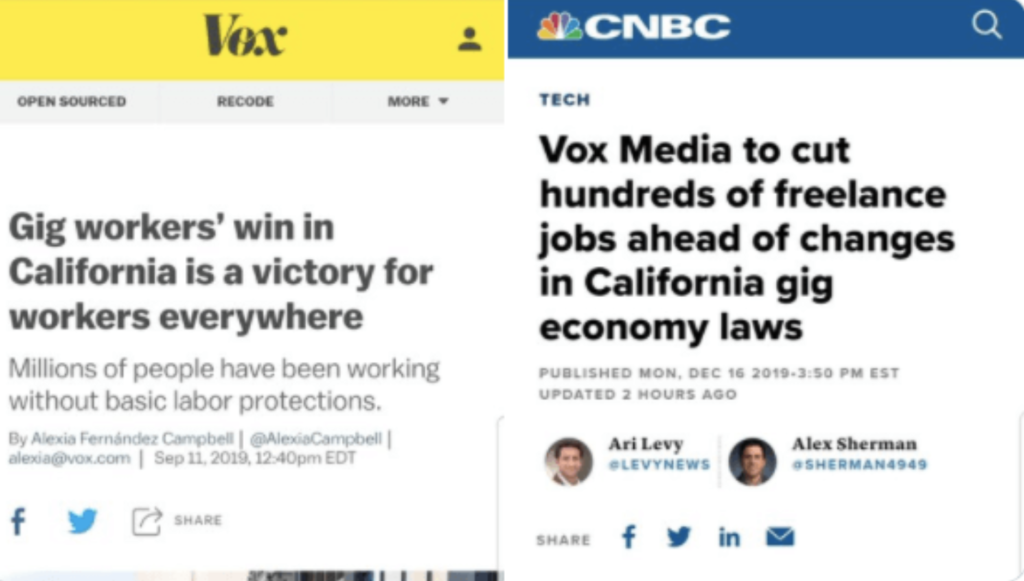California Legislature amends pro-worker law after influx of requests for exemption
On August 18th last year the Governor of California signed into law Assembly bill N0.5 (AB5). This law essentially limits an employer`s ability to classify workers as independent contractors. The law accomplishes this by providing a stricter guideline used to determine who can be labeled as an independent contractor. With a few exemptions, anyone not able to meet specified guidelines is expected to receive the same benefits and protections as a regular employee.
When the law was passed, it was championed as a victory for the working people. However, it was not too late until the law started squeezing the same people it was meant to help. I previously wrote about Vox Media, which after championing the law, announced it was going to cut jobs. So many other individuals who wished to work independently also worried about the loss of their independence. And to some in the gig economy, being classified as employees meant they lose the benefits of scheduling flexibility.

A year later, new amendments have added to the list of exempted professions
More than a year later since the law was passed, it is easy to see that the law has failed to achieve its intended purposes. But instead of admitting this failure of policy, legislators have instead made numerous amendments, providing exemptions to professions that have called for them.
According to Mintz, California has had to develop a less restrictive test for employees and contractors to assess their exemption eligibility.
California has amended its independent contractor law to make more jobs and professions exempt from the “ABC” test that AB 5 codified last year. Governor Newsom signed the amendment into law on September 4, 2020. It becomes effective immediately.
AB 2257 modifies and expands the list of professions exempt from the “ABC” test to include additional occupations and industry areas. These changes primarily impact freelance writers, musicians, film support crews and visual artists, making it easier for companies to classify them as independent contractors.
With these amendments, roughly 75 professions or types of businesses are now exempt from the independent contracting test set out in AB 5, meaning employers are able to use the common law Borello test instead of the more restrictive “ABC” test to assess whether the workers are employees or independent contractors.
This a classic case of judging policy by intentions instead of results
But one has to ask; if the law was so beneficial to employees and independent contractors, why are they asking to be exempt from it? Whether the California legislature did not foresee these negative consequences or instead decided to overlook them for the greater good, is something that is hard to say. But anyone with logic can see how raising the costs of hiring contractors would lead to fewer contracting jobs.
This is why so many professions like truckers moved to protect their livelihoods by asking for an exemption. The Recording Academy, which has had a big hand in getting the law to be amended recently to exempt music makers from the bill, also knew the unintended effects that they would have on workers in that industry.
What we have here is a classic example of progressive policy coming to terms with economic reality. Just because a policy is intended to help someone does not mean that it will end up achieving that purpose. The market is made of up numerous individuals all vying for different ends. When governments distort choice in the market in order to direct economic activity in a specific direction, you end up with socially and economically suboptimal conditions. This is because governments do not have enough information to know what social or economic arrangement would suit everyone at any period in time.
This is why people when left to their own choices make the best decisions on how to better themselves without producing tragic unintended consequences. This is why California has found itself in this situation. But, however, like most policymakers, instead of repealing a law that clearly does not work, the California legislature would rather add dozens of arbitrarily decided amendments, adding to its list of exempted professions, while still expecting other employers to observe those very same burdensome laws.